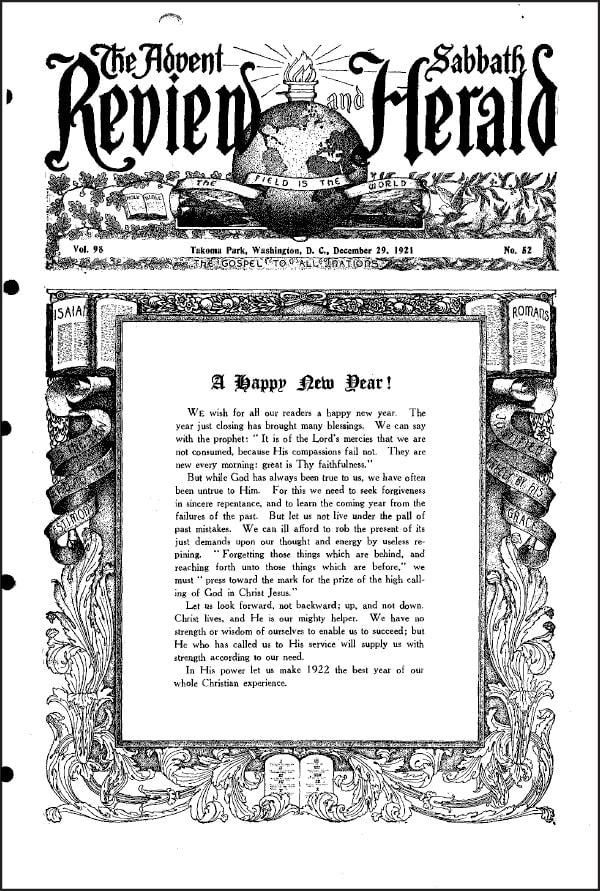
Over the years the Christmas season has been commemorated in various ways in the pages of the Adventist Review. Sometimes we learn best when we look back. See if you can connect to these excerpts from the last 100 years.—Editors
 1921
1921At first, there was nothing specifically “Christmasy” about December editions of the Advent Review and Sabbath Herald, which is what the journal was called then. However, the year’s final issue, looking ahead and setting the tone for the new year, graced its cover with a poem titled: “A Happy New Year!” That article’s message, though from 100 years ago, applies with notable accuracy to our present circumstances, as we seek to know how to live beyond a global pandemic.
“We wish for all our readers a happy new year. The year just closing has brought many blessings. We can say with the prophet: ‘It is of the Lord’s mercies that we are not consumed, because His compassions fail not. They are new every morning: great is Thy faithfulness.’
“But while God has always been true to us, we have often been untrue to Him. For this we need to seek forgiveness in sincere repentance, and to learn the coming year from the failures of the past. But let us not live under the pall of past mistakes. We can ill afford to rob the present of its just demands upon our thought and energy by useless repining. ‘Forgetting those things which are behind, and reaching forth unto those things which are before,’ we must ‘press toward the mark for the prize of the high calling of God in Christ Jesus.’
“Let us look forward, not backward; up, and not down. Christ lives, and He is our mighty helper. We have no strength or wisdom of ourselves to enable us to succeed; but He who has called us to His service will supply us with strength according to our need.
“In His power let us make 1922 the best year of our whole Christian experience.”
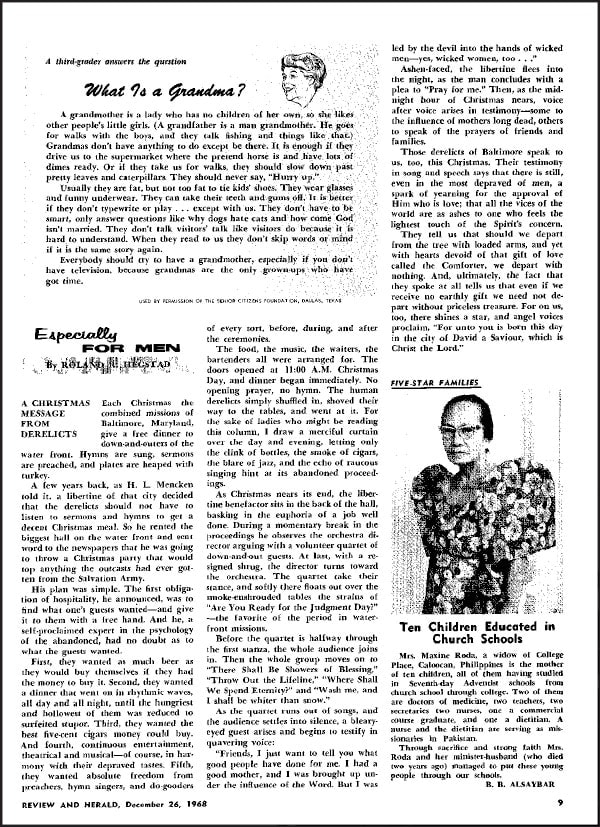 1968
1968The 1960s were a turbulent time in North America. The church saw its young people wrestling with issues of belief as well as others pervading society. Roland Hegstad, then an associate editor for Liberty magazine, wrote a column for our journal called Especially for Men. In his December 26 piece, “A Christmas Message From Derelicts,”* he recounts a Baltimore, Maryland, holiday event starring a “libertine” who spurred the crowd to debauchery, yet whose efforts were thwarted in an unexpected way. The story of what transpired instructs us all on the manifold workings of divine grace.
“As the quartet runs out of songs, and the audience settles into silence, a bleary-eyed guest arises and begins to testify in quavering voice:
‘Friends, I just want to tell you what good people have done for me. I had a good mother, and I was brought up under the influence of the Word. But I was led by the devil into the hands of wicked men—yes, wicked women, too . . .’
“Ashen-faced, the libertine flees into the night, as the man concludes with a plea to ‘pray for me.’ Then, as the midnight hour of Christmas nears, voice after voice arises in testimony—some to the influence of mothers long dead, others to speak of the prayers of friends and families.
“Those derelicts of Baltimore speak to us, too, this Christmas. Their testimony in song and speech says that there is still, even in the most depraved of men,* a spark of yearning for the approval of Him who is love; that all the vices of the world are as ashes to one who feels the lightest touch of the Spirit’s concern.
“They tell us that should we depart from the tree with loaded arms, and yet with hearts devoid of that gift of love called the Comforter, we depart with nothing. And, ultimately, the fact that they spoke at all tells us that even if we receive no earthly gift we need not depart without priceless treasure. For on us, too, there shines a star, and angel voices proclaim, ‘For unto you is born this day in the city of David a Saviour, which is Christ the Lord.’”
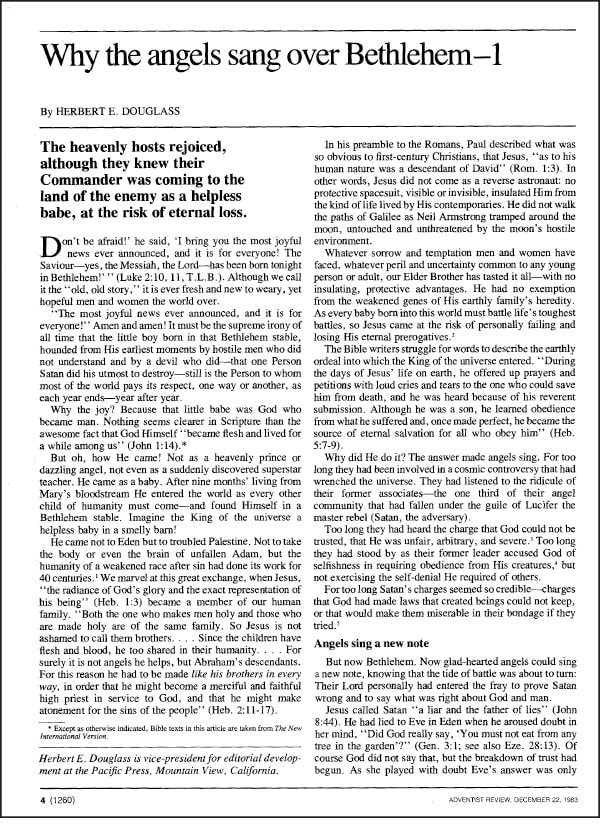 1983
1983The 1980s has been called “The Decade of Excess”—a time when the United States prospered and the Adventist Church continued to grow and make inroads into countries that were starting to open. This edition shows the magazine’s increasing attention to the Christmas theme by comparison with the Review’s earliest years. Adventist theologian Herbert Douglass contributed a piece titled, “Why the Angels Sang Over Bethlehem—1,” that was featured in the December 22, 1983, issue.
“So through His life and death, Jesus became humanity’s Saviour and Example—a Saviour who substituted Himself for all sinners in revealing the awful end of sin (being Godforsaken), and an Example who revealed the nature of true unselfishness, the fairness of God’s laws, and the perfect human response to God’s love.
“He could not be a Saviour unless He satisfied justice as our sinless Example, nor could He be our Example unless He resisted sin even unto death—the second death—as our Substitute, showing the universe that unselfishness is the true nature of a greater maligned God.
“The value of His death depended upon the quality of His life. If He had not obeyed His Father’s will in every respect under the same conditions as any son or daughter of Adam has had to live in this side of Eden, then Calvary, as far as our salvation is concerned, would not have been sufficient.”
In 1999, current executive editor Bill Knott wrote the piece “A Night to Meet our Need” while an associate editor of the journal, dedicating his gift for sensitive yet profound prose to the composition, excerpted here from our December 13, 1999, edition.
“And then, one day, the lights went on. I discovered that what it meant was ‘Glory to God in the highest,’ and that unbeknownst to me, I had been singing Latin all those years! So the song really did have a meaning all that time, and I never understood it until I heard it in my own language.
“That is the heart of the old story, I believe. It has had a meaning, a profound meaning, all these years. But only when we hear it in our own language, only when we see that the child born that night was the great God of the universe come down to live with common men and women like us, will we ever understand it. Only when we see the Jesus who was born in the middle of the night shift will we be ready to trust Him as the Saviour of our lives—lives lived out in sweat and pain and joy and home and work, yes, even work on the night shift.
“This is the Lord we proclaim at Christmas, the Word who was made flesh and dwelt among us, full of grace and truth. And with millions of common Christians all over this world, I pray with every fiber of my being for the day when the kingdoms of this world will become the kingdoms of our Lord and of His Christ.”
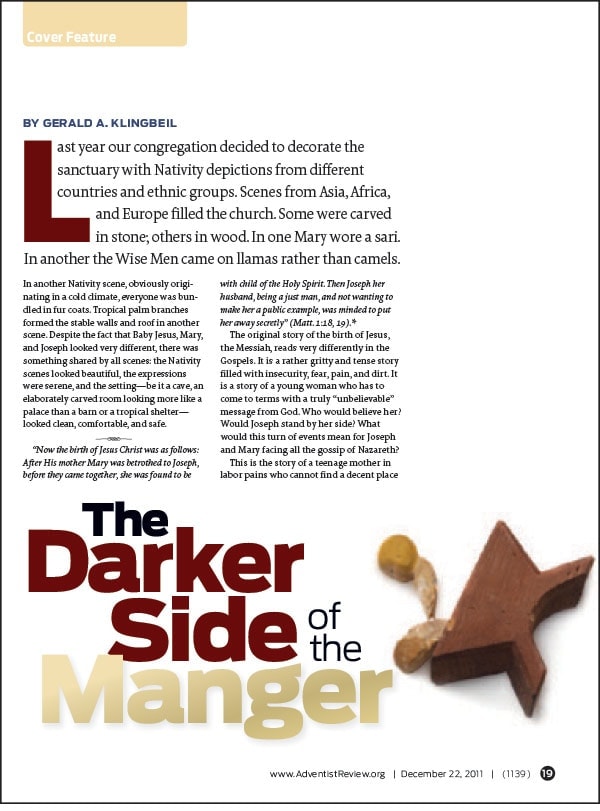 2011
2011By 2011, readers could count on the last edition of the year to deliver messages that spoke to the marvelous event when the Christ child came to the world in a humble stable. And the December 22 edition did not disappoint. Associate editor Gerald Klingbeil rounded out another year of the work of Adventist Review with his piece “The Darker Side of the Manger,” excerpted here.
“‘Let this mind be in you which was also in Christ Jesus, who, being in the form of God, did not consider it robbery to be equal with God, but made Himself of no reputation, taking the form of a bondservant, and coming in the likeness of men. And being found in appearance as a man, He humbled Himself and became obedient to the point of death, even the death of the cross’ (Phil. 2:5-8).
“Jesus knew the end from the beginning, and yet He stepped into our world. He chose to be born in a peasant’s family, living a life of hardship. He did it because He is interested in us—no, because He loves us, even in the midst of our sin grime and dirt that we so carefully try to mask and hide. Broken and mangled Baby Jesus is a powerful reminder of what the gospel is all about. It is authentically good news that has the power to transform lives. It is an invitation to let God fix the real problem in our lives.
“Hang on—can you hear the angels singing in wonder, awe, and amazement?”
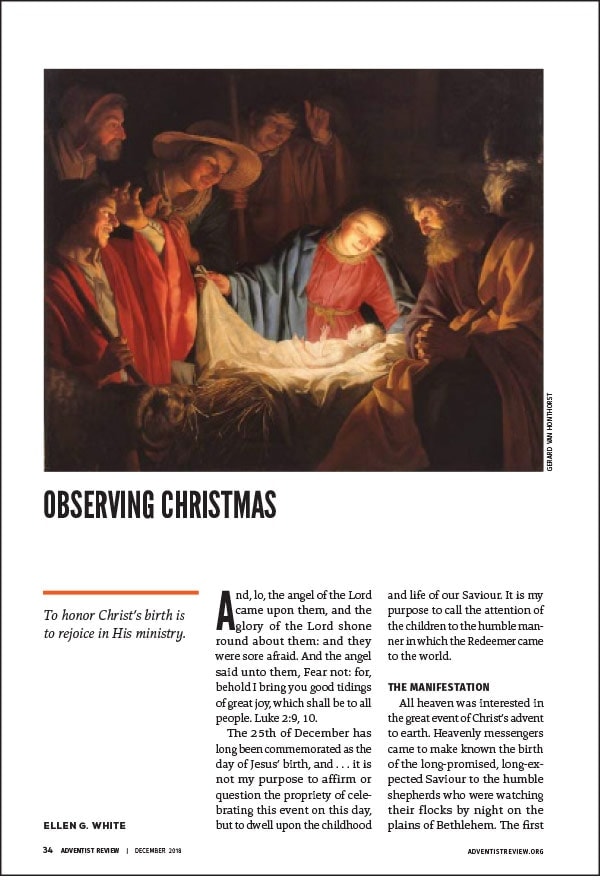 2018
2018By 2018, Adventist Review had transformed into a monthly 72-page journal. No longer the size of a traditional magazine, it was now smaller, sturdier, and longer than before—ideal for slipping into a laptop bag or purse, and ready for sharing. As we moved forward with an eye toward using new technology and marketing techniques to reach more readers, the December edition again reminded readers of the “reason for the season” with a piece called “Observing Christmas,” from the writings of Ellen. White.
“What matchless love Jesus has manifested for a fallen world! If angels sung because the Saviour was born in Bethlehem, shall not our hearts echo the glad strain, Glory to God in the highest, peace on earth, good will to men?
“Although we do not know the exact day of Christ’s birth, we would honor the sacred event. May the Lord forbid that anyone should be so narrow-minded as to overlook the event because there is an uncertainty in regard to the exact time. Let us do what we can to fasten the minds of the children upon those things which are precious to everyone who loves Jesus. Let us teach them how Jesus came into the world to bring hope, comfort, peace, and happiness to all. . . . Let the hearts of all respond with exceeding joy for the priceless gift of the Son of God.”—Review and Herald, Dec. 17, 1889.
*We acknowledge this is not the most charitable language that identifies drunks as “derelicts of Baltimore” or “the most depraved of men.”
Wilona Karimabadi is an assistant editor of the Adventist Review.